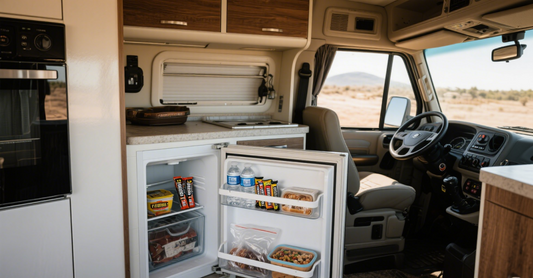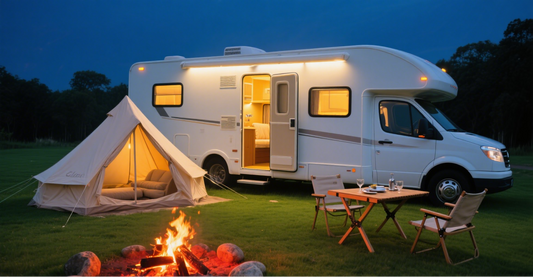Why Are Lithium Batteries So Expensive
With the continuous advancement and development of new energy technology, lithium batteries have become an upgraded alternative to lead-acid batteries. Lithium batteries are produced with lifepo4 components. Their lightweight design, high-performance design and deep cycle life make them increasingly popular.
Imagine that when you plan to buy lithium battery for weekend RV camping or prepare to install a trolling motor on a kayak for a day of fishing, you are shocked by the price of lithium batteries. You start to wonder if it is worth your investment to buy it for outdoor adventures, RV off-grid settings, sea trolling, solar energy storage or golf carts?
In this article, the Temgo team will discuss with you why these lithium batteries are so expensive. We will analyze the main factors behind the high cost of lithium batteries so that you can better make the right investment for your RV, boat, golf cart or off-grid solar system.


What Makes Lithium Batteries Special?
Lithium batteries are a technologically advanced power source that uses lithium-based chemistry to deliver high, stable energy for deep-cycle applications.
Think of it as an energy bucket, where lithium ions flow from a cathode (made of materials such as lithium iron phosphate or nickel manganese cobalt oxide) through a lithium salt electrolyte to a carbon or graphite anode, separated by a thin, permeable barrier. When charging, the ions store energy at the anode, and when discharging, the ions return to the cathode, powering your devices.
This process gives lithium batteries their high energy density, which means they can deliver powerful energy to your devices in a small, lightweight package, making them ideal for space-constrained RVs, trolling motors, and other applications.
For example, a 12V 100Ah lithium battery can power a 500W RV refrigerator for about 2.4 hours, and weighs less than half the weight of a lead-acid battery.


Why Lithium Batteries So Expensive
The high cost of lithium batteries stems from a number of factors, each of which adds to the price while ensuring that they meet your outdoor and off-grid needs. Below, Temgo will discuss these factors in detail.
Raw Materials
Battery cells, especially the cathode material, account for about 80% of the cost of lithium batteries. Key raw materials such as lithium, cobalt, nickel, and manganese are expensive due to limited global supply and high demand for electric vehicles and renewable energy systems. For example, cobalt mining in regions such as the Democratic Republic of Congo faces supply chain disruptions, while lithium mining in South America may be affected by environmental regulations (data source: USGS). Cobalt shortages may increase the cost of a 12V 100Ah trolling motor battery by $100 to $150, affecting your outdoor RV travel or boat trolling budget.
However, lithium iron phosphate (LiFePO4) batteries are about 20% cheaper than nickel manganese cobalt (NMC) batteries because they use iron instead of cobalt, making lithium batteries the best economic choice for deep-cycle applications such as RVs, boats, or golf carts.


Manufacturing Process
The production of lithium batteries requires high-precision production in specialized facilities. The process involves assembling the positive electrode, negative electrode, electrolyte, and separator in a clean room to prevent contamination, which can add $50 to $100 to the cost of a 36V golf cart battery. High-purity materials and advanced equipment ensure the safety and performance of lithium batteries, but also increase their cost. For example, manufacturing a 12V lithium battery for outdoor RV travel requires testing for resistance to humidity and temperature fluctuations.
Of course, some lithium battery manufacturers will explore ways to reduce production costs while ensuring that battery performance is not affected. For example, replacing graphite anodes with silicon anodes, although this can save 5-10% of costs, will shorten the battery life by 20%, affecting the stability of power supply for yachts or RVs. Therefore, whether it is powering your RV, yacht or golf cart or an off-grid solar system, paying attention to battery quality ensures that your battery performance is consistent.


Battery Management System (BMS)
BMS can be thought of as a battery's bodyguard, that continuously monitors the battery's state of charge, health, and temperature to prevent overcharging, over-discharging, or overheating. This is critical for safety in marine or RV environments, where trolling motor batteries may face high discharge rates or summer camping trips may exceed temperature limits. For example, a BMS in a 12V RV battery ensures that your refrigerator runs smoothly in 100°F (about 38°C) without the risk of failure.
Basic BMS units monitor voltage and temperature, while advanced systems include cell balancing or real-time diagnostics, which can add $20 to $50 to the cost of each battery. For solar energy storage or golf carts in demanding applications, a powerful BMS ensures stable performance of the battery.
If you are looking for a lithium battery with five-layer BMS protection and APP remote monitoring support for your golf carts of different brands such as Yamaha, club car, ezgo, etc., you can learn about the deep cycle 36V or 48V lithium battery designed by the Temgo team!


Testing and Certification
Lithium batteries must meet stringent safety standards such as UL, CE, and UN to ensure they are reliable and safe for use in RV, marine, golf cart, and solar applications. The certification process can cost between $500 and $20,000 and involves rigorous testing.
For example, simulating years of heavy use on a 48V golf cart battery can add $5,000 to $10,000 to production costs.
If the battery fails, redesign and recertification can add further costs. These tests can prevent your 48V golf cart lithium battery from failing during use.
Battery Pack Design
The battery pack (the housing that holds the cells) contains components such as wiring harnesses, relays, connectors, and optional heating/cooling systems customized for specific applications.
For example, a 12V marine battery pack with corrosion-resistant connectors will cost $50 to $75 more, but will prevent failures in salt and moisture environments. 48V golf cart lithium battery packs may include cooling systems to maintain performance in hot weather, but this also increases production costs. Although the cost will increase, its high-quality components ensure the durability of your yacht and golf cart.
How Much Will You Pay for Your RV, Boat, or Golf Cart Battery?
The price of lithium batteries varies depending on the voltage and purpose of use. Here is a budget for common lithium battery models to help you buy the best lithium battery for you:
12V Lithium Batteries: These batteries cost about $135/kWh, and 100Ah batteries cost between $750 and $1200, which is perfect for RVs, campers, kayaks, boats, and trolling motors.
For example, a 12 volt 100Ah lithium battery can power a 500 watt RV refrigerator for about 2.4 hours, or a trolling motor for a full day of fishing. Generally, lithium batteries have a lifespan of 5-10 years (depending on how they are used and maintained), which can save you $500 compared to replacing lead-acid batteries every two years.
36V Lithium Batteries: These batteries cost about $200/kWh, and 100-150Ah batteries cost between $1200 and $3000, and are designed for golf carts (fox example Club Car, Yamaha, ezgo, icon). 36V 100Ah golf cart batteries ensure all-day driving on the course and provide continuous strong power in hilly terrain.
48V Lithium Batteries: These batteries cost about $250/kWh, and 105-160Ah batteries cost between $1300 and $8500, and are designed for high-performance golf carts. 48V 100Ah lithium batteries support long-term driving without charging, providing convenience for golf enthusiasts.
To find the ideal lithium battery for your RV, boat or golf cart, you can browse the product catalog of Temgo shop to get a lithium battery solution tailored for you.
Are Lithium Batteries Worth the Extra Cost Compared to Lead-Acid?
Compared to lead-acid batteries, lithium batteries offer a lower upfront cost, but in the long run, they are more cost-effective in deep-cycle applications such as RVs and golf carts, and can reduce the frequent replacement and maintenance costs of your lead-acid batteries.
Cost: A 20 kWh lithium battery costs about $2,800, while lead-acid batteries cost $1,500-1,600. However, lithium batteries have a lifespan of up to 10 years (10,000 cycles), while lead-acid batteries only have a lifespan of 1-2 years (300-400 cycles). For example, a 12V lithium battery that costs $1,200 can save $1,000 in 10 years by avoiding multiple lead-acid replacements.
Energy density: Lithium-ion batteries weigh less than lead-acid batteries, but have a higher capacity per unit volume, making them ideal for RVs and kayaks where weight is a concern. For example, a 12V 100Ah lithium battery weighs about 30 pounds, while a lead-acid battery weighs 60-70 pounds, which helps save you fuel on your yacht.
Charging Speed: Lithium batteries only take 3-5 hours to charge (charging time varies depending on battery capacity), while lead-acid batteries take 8 hours, which saves a lot of charging time for RV camping or sea trolling, and also reduces downtime.
Depth of Discharge: Lithium batteries have a depth of discharge of 80%, while lead-acid batteries have a depth of discharge of 50%, which allows you to use more power without charging. For example, a 12V 200Ah lithium battery can power the lighting and household appliances of a solar home all night.
Safety: Compared with lead-acid batteries with corrosive sulfuric acid, lithium iron phosphate batteries have a lower risk of combustion or leakage, so they are safer to use in marine and RV environments where leakage is a concern.
Environmental impact: Lithium batteries, especially lithium iron phosphate batteries, are recyclable and generally contain no cobalt, unlike lead-acid batteries, which contain toxic lead and require careful disposal. (Source: U.S. Environmental Protection Agency)
Maintenance: Lithium batteries are very low maintenance, while lead-acid batteries require regular water checks. For trolling motors, this means more time fishing and less maintenance hassles.
Why Choose Lithium Batteries For Your Rv, Boat, Golf Cart Or Solar System?
Lithium-ion batteries, especially lithium iron phosphate batteries, are tailor-made for outdoor and off-grid enthusiasts. Here are the reasons why they are ideal for your application scenarios:
RVs and campers: A 12V 100Ah lithium battery can power a 500W refrigerator for about 2.4 hours, and its lightweight design saves space and fuel. Its 5-10 year lifespan ensures reliable power during years of camping. For multi-day trips, it is recommended to choose a higher capacity 12V 200Ah battery.


Marine and trolling motors for kayaks, yachts: These batteries typically charge in 2 hours and can operate in temperatures from -4°F to 140°F (-20°C to 72°C), making them ideal for marine environments. Their battery management system (BMS) prevents high-power trolling motors from overheating during use. For example, a 12V 100Ah battery can power a kayak trolling motor for 8 hours, ensuring reliable travel on the water.


Golf Carts: Temgo 36V and 48V lithium batteries have a high discharge rate to ensure stable performance on rugged courses. A 48V 100Ah battery can support a full day of golf without recharging, enhancing your experience with golf cart brands such as Club Car or Yamaha.


Off-Grid Solar Systems: Lithium batteries have a discharge depth of up to 80%, maximizing solar power to power your home during power outages. A 12V 200Ah battery can power lights and appliances overnight. Pair with a 400W solar panel for optimal off-grid performance.


Ready to upgrade your equipment to lithium power? Browse Temgo 12V, 36V, and 48V lithium batteries to find the best solution for your RVs, boats, golf carts, or solar systems.
Is a Lithium Battery Right for Your Needs?
For RV campers, boating enthusiasts, golfers and off-grid residential users, lithium batteries' long life, fast charging, high energy density, versatile safety and environmental protection make them a worthwhile long-term investment.
Imagine your 12V trolling motor battery lasting a full day of non-stop operation on a fishing trip, or your battery powering various appliances for days on an RV adventure. Compared with lead-acid batteries, lithium batteries save costs by reducing maintenance and replacement times.
Therefore, whether it is now or in the future, choosing lithium batteries for your facility equipment to continuously and stably supply power is a wise investment decision, which not only meets your sustainable and environmental requirements, but also provides your power with a longer life, low maintenance costs and higher safety performance.


